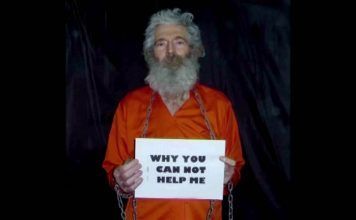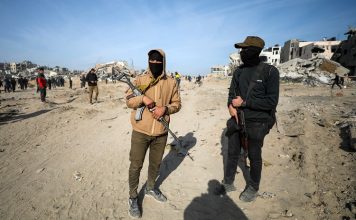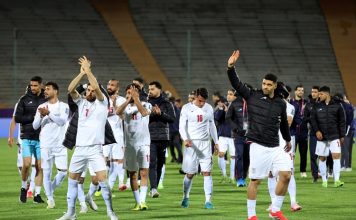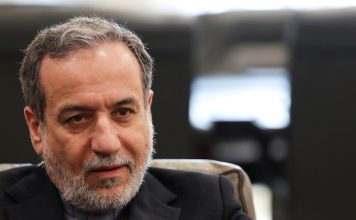The detention of a female university student who publicly stripped to her undergarments to protest the mandatory hijab has once again put the status of Iranian women and their incarceration in the international spotlight.
Ahoo Daryaei was seen on videos posted by Amnesty International walking around Tehran’s Islamic Azad University on Nov. 2 in her underwear. Amnesty said the woman was then “violently arrested” by authorities after she removed her clothes “in protest against abusive enforcement of compulsory veiling.”
Woman Strips off Clothes at Iran University in Apparent Protest, Reports Say
In a subsequent post on X, Amnesty added that “allegations of beatings & sexual violence against her during arrest need independent & impartial investigations.”
The university’s public relations director said the young woman had mental health concerns and had been taken to a psychiatric hospital, according to the Iranian newspaper Aftab.
Iran’s authorities have been accused by international rights bodies of punishing women who protest against social injustice and gender inequality by deeming them to lack mental capacity and incarcerating them in mental health wards.
The arrest was condemned in a Nov. 3 post on X by Nobel Peace Prize laureate Narges Mohammadi, who said: “Women pay the price for defiance, but we do not bow down to force. The student who protested at the university turned her body—long weaponized as a tool of repression—into a symbol of dissent.”
Her detention was also criticized by Nobel Peace Prize laureate Shirin Ebadi on Instagram.
“If the protesting student at Azad University was ‘ill,’ why was she arrested? Is the security apparatus responsible for citizens’ medical care?” Ebadi wrote.
Human rights campaigners and international rights groups called for the young woman’s immediate release.
The arrest comes two years after the September death in police custody of 22-year-old Mahsa Amini, who had been arrested for failing to wear her hijab. Her death launched the ‘Woman, Life, Freedom’ gender equality movement in Iran, and ignited six months of nationwide protests against the regime.
The Islamic Republic is one of the world’s worst performing states for gender equality. The World Economic Forum’s latest annual global gender gap index published in June, which highlights gender equality concerns in countries around the world, ranked Iran 143rd out of 146 listed countries.
EXCLUSIVE: New UN Rapporteur on Iran to Focus on Gender Inequality, Executions
Dr. Mai Sato, the United Nations Special Rapporteur on the Islamic Republic of Iran said she would be “monitoring this incident closely, including the authorities’ response” in a Nov. 2 post on X.
The arrest took place one day after Sato’s first report to the UN General Assembly, which was published on Nov. 1 and urged the Iranian government to prioritize women’s rights.
In her report, Sato said she was “particularly concerned by the State’s response to the ‘Woman, Life, freedom’ movement, and the Chastity and Hijab Bill,” which imposed draconian penalties and jail terms for women flouting the mandatory dress code in Iran.
“Iran remains one of the few countries that have not yet ratified the Convention on the Elimination of All Forms of Discrimination against Women,” Sato said. “The right to life stands as a fundamental concern, particularly given the alarming increase in executions.”
Women detained inside Iran’s jails have become vocal campaigners for prison reform, and regularly stage protests about prison conditions, violence against women, psychological abuse and the denial of medical treatment by officials as forms of punishment.
More than 500 women’s rights advocates are currently imprisoned in the country, with many at risk of execution following convictions for poorly defined offenses which also carry the death penalty.
Nobel Peace Prize winner and human rights campaigner Narges Mohammadi, who is reported to have serious heart and lung conditions, was denied medical treatment for more than two months before being transported to a hospital.
“After almost 9 weeks of medical denial Narges Mohammadi is finally hospitalized thanks to the support of civil and human rights activists, the Free Narges coalition and the pressure from the global community and media,” her husband Taghi Rahmani said in an Oct. 27 post on X. “These nine weeks of delay, along with the long years of imprisonment & solitary confinement have caused serious harm to Narges’s health requiring an extended long course of medical attention.”
Mohammadi was imprisoned in 2021 after she was charged with spreading propaganda against the regime. She is currently serving a 12-year-sentence for multiple offenses. Mohammadi has spent the last two decades in and out of prison for her activism, and has been arrested 13 times.
Mohammadi has also staged repeated hunger strikes in prison for a range of reasons including: protesting the denial of her medical care; showing solidarity with protesters during the 2022 nationwide anti-government protests; poor conditions inside the notorious Evin prison in Tehran; the persecution of minority groups in Iran such as the Baha’i community; and the prolific use of the death penalty in Iran.
The Islamic Republic is currently the world’s most prolific executioner of children, women and men on a per capita basis. Since July, an estimated 342 people have been executed, including 13 women.
Imprisoned women have increasingly focused on hunger strikes as a means to draw attention to the Iranian government’s treatment of detainees.
Varisheh Moradi, a political prisoner held in Evin who is at risk of execution, began a hunger strike on Oct. 10 to protest the death sentences for female activists in Iran. Female human rights campaigners in Iran have increasingly been sentenced to death, according to a July 30 report by the Center for Human Rights in Iran (CHRI).
“Multiple women political prisoners are at risk of execution based on sham charges,” CHRI’s report said. “Faced with a women’s movement in Iran that refuses to back down, Islamic Republic authorities are now trying to threaten these women with the gallows, in a desperate attempt to silence dissent.”
The report identified the following women at risk of execution: Pekhshan Azizi, a Kurdish women’s rights activist; Sharifeh Mohammadi, a labor activist; Nasim Gholami Simiyari; and Moradi.
Moradi’s health deteriorated on the 16th day of her hunger strike, following severe weight loss which has left her in critical condition, according to an Oct. 25 Instagram post by CHRI.
Moradi was arrested in August 2023 and charged with ‘rebellion’ for her membership to a Kurdish opposition party.
Women are also responsible for the viral campaign inside Iran’s prisons to end executions in the country. The ‘No to Executions’ campaign, which is now in its 40th week, began with a focus on female prisoners in Iran. The movement, which calls for the abolition of the death penalty and a moratorium on all executions, has now spread to more than 23 prisons across the country.
The hunger strikes were launched on Jan. 30 by political prisoners in Karaj’s Ghezelhesar prison after they witnessed months of group executions. The week day of Tuesday was chosen because the inmates noticed that prisoners were regularly placed in solitary confinement on that day before being hanged in the prison. The campaign has also come to be known as ‘Black Tuesdays’ or ‘No Death Penalty Tuesdays.’
Females prisoners continue to stage the weekly protest despite the risk of physical and sexual violence by prison officials.
“On 6 August 2024, Mohammadi was reportedly subjected to physical violence during an incident in the women’s ward of Evin Prison. She allegedly lost consciousness, and sustained injuries to her ribcage and other parts of her body,” an Aug. 20 report by the United Nations Human Rights Council said.
“We are deeply concerned about the climate of discrimination and fear that women human rights defenders’ live under in Iran,” the council said in a June 27 statement. “The extreme discrimination and violence against women and girls are unacceptable.”













